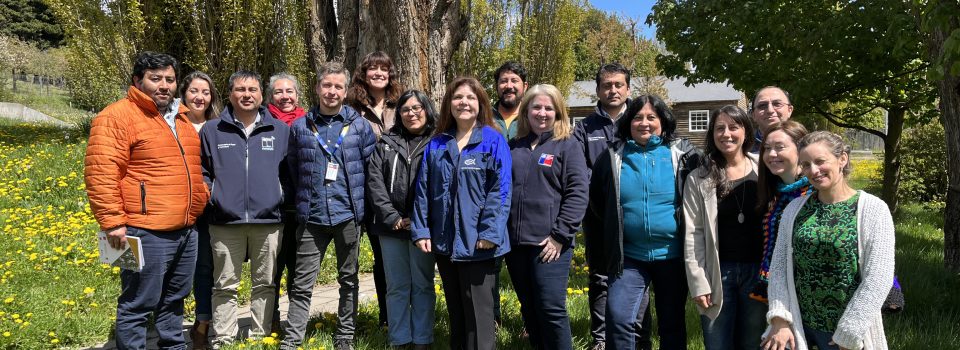Southern Science Node and public services identify priority lines of research for aquatic ecosystems of Aysén and Magallanes
November 15th, 2023In the context of the process of energizing Roadmap in science, technology, knowledge and innovation – a planning instrument for the year 2030 – Southern Macrozone 17 public institutions linked to the marine and freshwater ecosystems met, in simultaneous meetings that took place in Coyhaique and Punta Arenas.
Austral Macrozone has a large maritime surface, made up of fjords, channels, continental waters and important marine protected areas. These ecosystems are key to global change, marine conservation and economic activities such as fishing, aquaculture and tourism. At the same time, they are critical for the development of economic, recreational, and cultural activities and for the identity of indigenous and coastal communities.
In this context, it is urgent to generate information and knowledge about aquatic ecosystems that allow their characterization, to provide updated information, face events that impact the communities life’s quality and to provide background information for decision-making, promoting sustainable development of these territories. .
In this way, Nodo Ciencia Austral collaborative network proposed generating spaces for participation with public institutions whose work is related to aquatic ecosystems to identify and highlight lines of research with territorial relevance.
17 public services Representatives participated in “Building a Roadmap in Aquatic Ecosystems of the Southern Macrozone: “Institutional Vision workshop” that was carried out simultaneously in Coyhaique and Punta Arenas during October 31th morning. In this instance, public actors worked in groups to dialogue and identify gaps, opportunities, challenges and interest topics to their institution, which demand the participation of actors in the science, technology, knowledge and innovation (CTCI) ecosystem.
In this context, Nodo Ciencia Austral, director Dr. Juan Carlos Aravena, highlighted that from this collaborative network “we are convinced that we must work collaboratively and interdisciplinary among those who make up the science and technology ecosystem, and with that spirit we convene this meeting between public actors linked to aquatic systems. In the Roadmap we were in charge of this area, we needed to meet, discuss, plan and build together around the priority lines of these ecosystems. Today in this workshop we were able to learn from the demands of these sectors and we have confirmed the needs for coordination and articulation between all actors. With these meetings, we continue to strengthen the Nodo Ciencia Austral network.”
This work is led by two of the Node associated institutions. Fisheries Development Institute (IFOP) and CEQUA Foundation Regional Center, with the purpose of updating and energizing the CTCI Roadmap, modifying the “Fisheries and Aquaculture” program. identified in previous stages by a new program called “Aquatic Ecosystems”.
Along these lines, Alejandra Lafon, Head of IFOP’s Aysén headquarters, commented: “many institutions and activities are developed around aquatic ecosystems, and many times actors do not talk. Each one sees them from their own angle or regulations, therefore, in this meeting what is being seen is that there are many similarities, there are many meeting points, which is vital to identify, highlight and that the different actors know each other and communicate. Realize that this is happening in order to move forward in defining priority lines.”
For her part, Ximena Gallardo Zonal Fisheries Director in Magallanes,, thanked Nodo Ciencia Austral for opening such a space, “where we are recognizing new realities and needs around aquatic ecosystems.” She added that “although as public services we are clear about our gaps from the territory, we are now faced with a new reality, maritorio, despite its riches, has high complexities, and today it puts us in several public services, not only those associated with fishing, but also those linked to land and science, to work collaboratively and effectively to face regulatory, supervisory and knowledge-based challenges.”
Meanwhile, professional Eduardo Barros from Nodo Ciencia Austral concluded that “with the amount of input that was collected in this workshop, a cooperative, collaborative science with territorial relevance can be planned, asking ourselves what research agenda is needed in ecosystems. aquatic areas of the Aysén and Magallanes regions and Chilean Antarctica?
To these workshops with public services, new spaces will be added with actors from academia, NGOs and other institutions that develop research in the southern regions. Subsequently, with economic activities representatives, thus seeking to have a comprehensive view of all the actors that interact in aquatic ecosystems.
It should be noted that, seeking to contribute to decentralization and equity in matters of CTCI, Nodo Ciencia Austral forms a broad collaborative work network made up of ten Austral Macrozone institutions: Universidad de Magallanes, Universidad de Aysén, Patagonia Center for Ecosystems Research (CIEP), Chilean Antarctic Institute (INACH), Patagonia Campus of Universidad Austral of Chile, Magallanes Museum Network, Cape Horn International Center (CHIC), Fisheries Development Institute (IFOP), Aysén Regional Museum and Center for Quaternary, Fire-Patagonia and Antarctic Studies (CEQUA). An initiative financed by the National Research and Development Agency (ANID).
Press related links:
